Book Recommendations
Personal recommendations from Pastor Josh. This isn’t even the tip of the iceberg for what he wants you to read. It’s merely a start in some of the more regularly requested topics. You can scroll down to see titles grouped under “Introductory Theology,” “Spiritual Discipline,” “Nazarene Theology,” “Worship,” “End Times,” and “Christian Politics.” Most of these titles are available for loan from Pastor. He’d be thrilled by your inquiry! Just ask!
“Spend all the morning, or at least five hours in twenty-four, in reading the most useful books, and that regularly and constantly.”
– John Wesley
Introductory Theology
This is by no means a comprehensive list of all the books that I think you should read to get an understanding of general Christian theology. In fact, as a rule I try to read broadly from a variety of authors from different theological traditions, ethnicity, and gender. Unfortunately, with the exception of the collection of Nazarene writings at the bottom, this section is all white male Anglicans. We all, especially me, have room to improve. However, it’s a start. If you wish to go deeper, talk to me. I love these conversations!
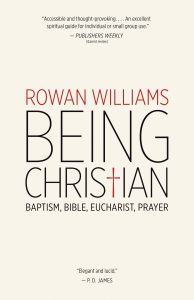
My first recommendation is Being Christian by Rowan Williams, former Archbishop of Canterbury. I recommend this book first because it is short, easy to read, and a beautiful summation of generally what it means to be Christian.
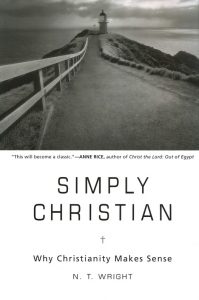
My next (and a personal favorite) recommendation is Simply Christian by N.T. Wright. I’m recommending yet another Anglican Bishop for in this category, perhaps because of the Anglican church’s uniquely broad perspective on Christian theology. They are very much protestant, yet also very much catholic. Not only that, they are also the mother theological tradition of Methodism (to which Nazarenes belong), as Wesley lived and died an Anglican priest and saw Methodism as a discipleship practice within Anglicanism. All that aside, this is still an excellent book. A little longer than being Christian, and perhaps at times a little headier, but still a must read. For those looking to jump in to something thicker right away, start here.
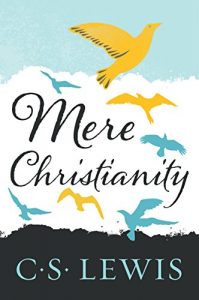
This is a classic. Mere Christianity by C.S. Lewis is basically the original Simply Christian. It’s short, accessible, and a must read.
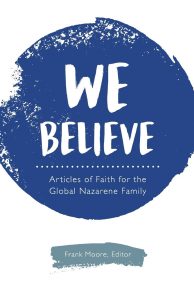
Ok. So I listed three Anglican authors in a row. Now for a collection of Nazarenes. This is We Believe, a collection of essays edited by Frank Moore. These essays are each on one of the sixteen Nazarene Articles of Faith. Unfortunately, the book was not published in time to reflect the most recent updates in the wording of the Articles (updates that were sorely needed), but still this is an excellent resource for a beginner’s look at Nazarene doctrine.
Spiritual Discipline
This is at the core of growth in discipleship. This is why it’s next in the list, even though it would seem to make sense to go straight to Nazarene Theology. A good practice is to have two books going at a time. Read theology or church history or something academic and at the same time read something spiritual that teaches you how to pray. Read one vigorously for your mind. Read the other purposefully and slowly for your soul. These books tend to be the shortest books that I read, but take the longest for me to get through.
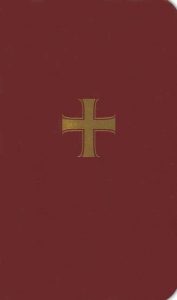
First and foremost in the Spiritual Discipline section, and probably should be listed first in the entire book list, is a prayer book. The book I have pictured here is A Guide to Prayer for All God’s People compiled by Rueben P. Job and Norman Shawchuck. This is one of three prayer books put out by these two through Upper Room Press. I from year to year will use A Guide to Prayer for Ministers and Other Servants. I rotate on occasion, usually from year to year, on what prayer liturgy to follow – but every day should start with some prayer liturgy! One year may be A Guide to Prayer, another year may be Common Prayer: A Liturgy for Ordinary Radicals, another may be daily prayers out of The Book of Common Prayer, or another yet Disciplines for the Inner Life by Bob and Michael Benson. Whether you rotate or not or even use one of these listed or not, a great way to make sure your prayer is formed by something other than the fickleness of your own heart is to discipline it with a received liturgy.
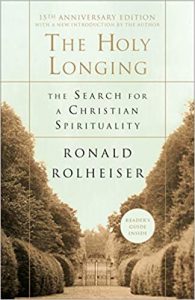
I read The Holy Longing by Ronald Rolheiser off of a recommendation by brother Bernerd, a good friend and spiritual master out of Australia who now lives in London, England. I’m re-reading it now. It’s still a masterpiece. Rolheiser’s understanding of Incarnational theology and the resulting difference between mere theists and Christians is particularly good! We as a church have broadly sacrificed our Christian spirituality for the porridge of mere theism! Therefore, this is a must read.
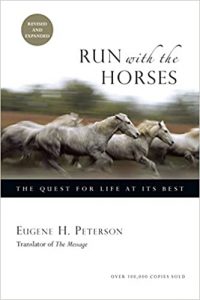
For what it’s worth, I love Eugene Peterson. He was a pastor’s pastor and a beautiful writer and a powerfully formative voice in my theology of ministry. Most of the books that I own of his have to do with pastoral ministry, but all of his writing, including Run with the Horses (which is actually a commentary on Jeremiah) are thick with Spiritual disciplines. Don’t stop with this title, explore his books.
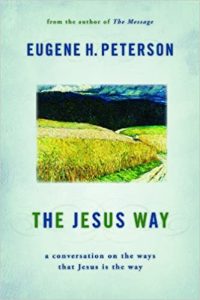
I meant it when I said check out more of Eugene Peterson’s titles. Here’s The Jesus Way. It’s a little longer, but powerful. Take your time through it.
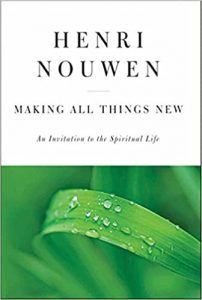
Henri Nouwen is another one of my favorite authors. Here’s his invitation into the spiritual life, Making All Things New.
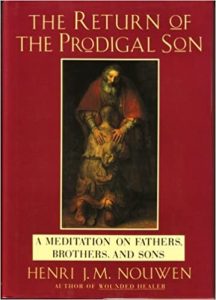
Like Peterson, Nouwen has no bad titles. Here’s another one dear to my heart, The Return of the Prodigal Son.
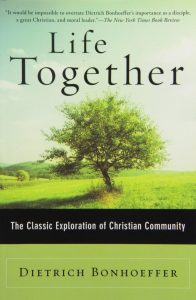
Dietrich Bonhoeffer is a 20th century martyr killed for his devotion to God’s Kingdom over and above devotion to state. He’s a much needed voice these days. Here’s his masterpiece, Life Together.
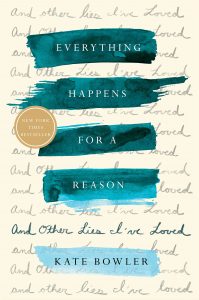
Hang on tight when you read this one. Everything Happens for a Reason by Kate Bowler is raw, punchy, honest, and a breath of fresh air. It very much embraces the Spirit of the Psalms and may prove to be a balm to those who may be experiencing suffering.
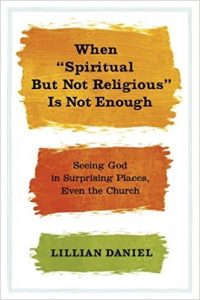
Lillian Daniel is funny and insightful. Please do read and enjoy, When “Spiritual but not Religious” is not enough.
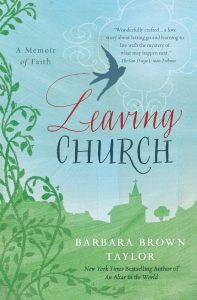
I really don’t know how to describe or categorize Barbara Brown Taylor’s works, but her trilogy consisting of Leaving Church, An Altar in the World, and Learning to Walk in the Dark are all very much insightful. I’ll place them here.
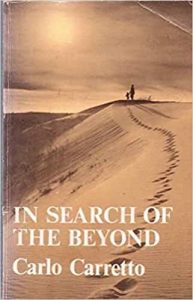
The book, In Search of the Great Beyond by Carlo Carretto is a wonderful series of parables that offer cool streams of insight into Christian spiritual living.
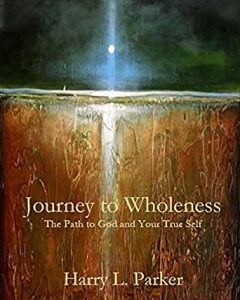
I see this list is starting to get a little out of control, so I’ll round it out with Journey to Wholeness by Harry Parker. This is an excellent book that covers broadly many of the spiritual practices that make a Christian a Christian. Be sure to give this one a read.
Nazarene Theology
We’re a Nazarene Church. The thing that distinguishes the Nazarene denomination from other denominations is our emphasis on Christian Holiness. It’s not that other Christians don’t believe in the importance of holy living, it’s just that we’ve made it our trademark. Here’s a couple books that articulate well what I mean when I refer to holiness.
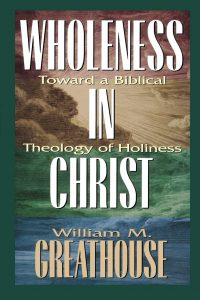
Who better to explain the Nazarene doctrine of holiness than a former president of Nazarene Theological Seminary and General Superintendent Emeritus? This is what we get with William Greathouse in his book, Wholeness in Christ. It’s accessible to read and worth the look.
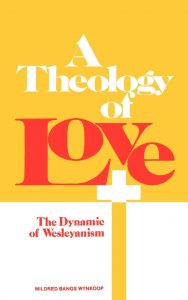
In A Theology of Love by Mildred Bangs Wynkoop, we get an excellent summation of what we mean when we say that “entire sanctification” is a “perfect love of God and a perfect love of others.”
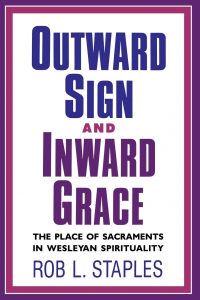
Outward Sign and Inward Grace by Rob Staples could belong in a small variety of sections from worship, to spiritual disciplines, to where it is now in Nazarene Theology. I ultimately decided to put it here because unfortunately over the last several decades, Nazarene churches, for reasons unknown to me, have lost much of their sacramental identity. However, going back to our origins in Wesleyan Methodism and looking at the first several decades of Nazarene practice and theology, we come from a very sacramental background! Dr. Staples writes a wonderful work to help us reclaim in a fresh way some of that which was lost.
Worship
This is a subject that is very near and dear to my heart. This is the primary task of the church, with the other task of similar importance being service. But without worship, we’re but “clanging gongs and clashing cymbals.”
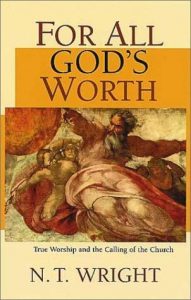
Here’s N.T. Wright again in a short and concise book, For All God’s Worth.
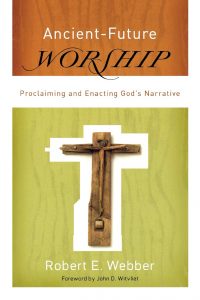
Here’s the opposite of short and easy to read, Ancient Future Worship by Robert Webber. While it is a bit of a wading through the weeds for those not used to more academic writing, it is absolutely worth the effort. Give it a try. I dare you.
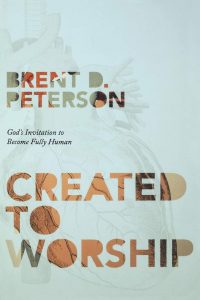
To round out this section, here is another Nazarene selection, Created to Worship by Brent Peterson. Also applicable in this category is Outward Sign and Inward Grace by Rob Staples, listed under “Nazarene Theology.”
End Times
For all the mystery that the Bible leaves us in regards to the end of days, there are some astonishingly specific books out there about it. We all love mystery thrillers, and we especially love disaster stories. This is why we slow down to gawk at car wrecks. This is why we get glued to cable news. This is also why we get hooked on bad theology. Christians believe in good news and look forward to the return of the King who will “wipe every tear from every eye” ushering in a time when “death will be no more.” Leave the disasters and guessing games to fiction books. Here’s some good theology.
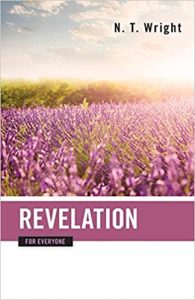
Here’s Professor N.T. Wright again with Revelation for Everyone. This a short, clear, and easily accessible commentary on that mysterious book at the end of the Bible.
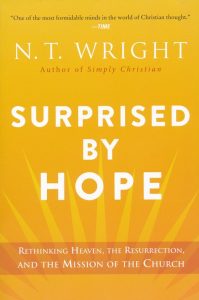
Here’s the last of my N.T. Wright suggestions on this page, but certainly not the last of my suggestions from him total. The man has written hundreds of books and is still writing! And they are all of stellar quality. This one spells out quite nicely a responsible eschatology, or doctrine of the end times.
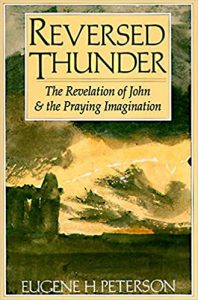
Here’s another classic by Eugene Peterson. Reversed Thunder could have been put with the “Spiritual Disciplines,” but it’s refrain on the “last words” also gives it a spot here. Eschatology as a spiritual discipline. Who knew?
Christian Politics
It’s a risky move putting this section in. This is where I very well may lose you. However, it’s what everyone wants to talk about and frankly, with all the partisan and nationalist idolatry in the church right now, it’s a conversation we desperately need.
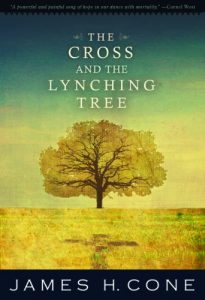
The Cross and the Lynching Tree by Dr. James Cone is a desperately needed book in these times. Please read with an open heart and a spirit of repentance.
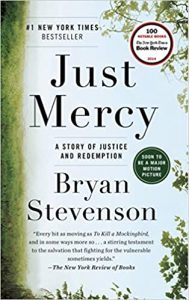
Ok, so Just Mercy by Bryan Stevenson isn’t necessarily a work of theology nor is it necessarily directed to the church. But there are powerful Christian undertones in it and it is worth the read. Bonus points if you watch the movie.
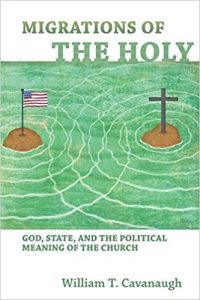
Migrations of the Holy by William Cavanaugh is an excellent read for anyone struggling with the relationship between church and state and where the Christian should stand. It’s a little heady, but a careful read should get you through. It’s definitely a more productive use of time than cable news.
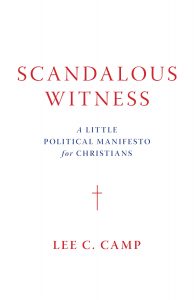
Scandalous Witness by Lee C. Camp is another weighty book on the relationship between the Christians who are faithful to God’s Kingdom and the nation they happen to find themselves living in. Another tough read, but a good one.
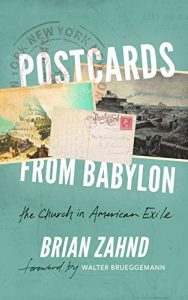
Brian Zahnd is one of my favorite authors. Postcards from Babylon is a relevant book. Give it a try. It has the message of the previous two books, but in a much easier to follow format.
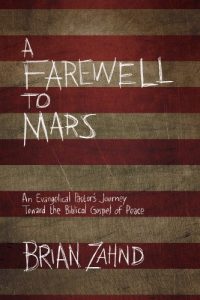
I said I liked Brian Zahnd. Here’s another one from him, A Farewell to Mars. Perhaps you should read this one first.
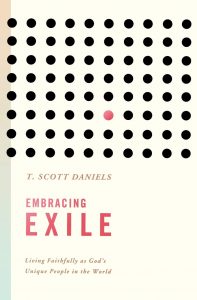
And finally, a Nazarene publication. Embracing Exile by T. Scott Daniels is yet one last call, this time from the Wesleyan Holiness perspective, to check again exactly which kingdom we’re faithful to.